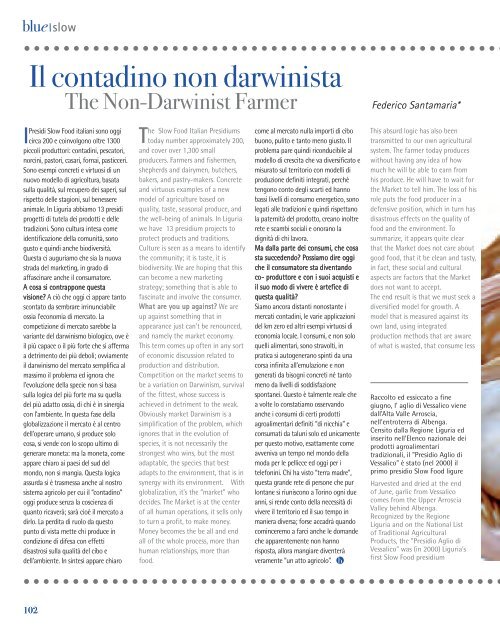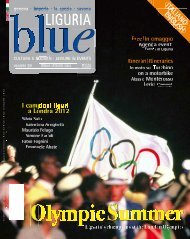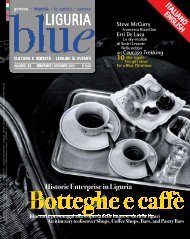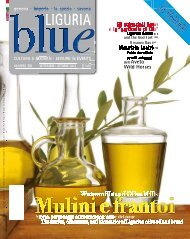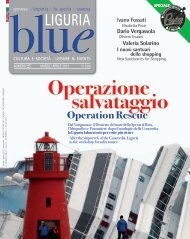Facciamoci sorprendere - Blue Liguria - Sagep
Facciamoci sorprendere - Blue Liguria - Sagep
Facciamoci sorprendere - Blue Liguria - Sagep
Create successful ePaper yourself
Turn your PDF publications into a flip-book with our unique Google optimized e-Paper software.
lue<br />
IPresìdi Slow Food italiani sono oggi<br />
circa 200 e coinvolgono oltre 1300<br />
piccoli produttori: contadini, pescatori,<br />
norcini, pastori, casari, fornai, pasticceri.<br />
Sono esempi concreti e virtuosi di un<br />
nuovo modello di agricoltura, basata<br />
sulla qualità, sul recupero dei saperi, sul<br />
rispetto delle stagioni, sul benessere<br />
animale. In <strong>Liguria</strong> abbiamo 13 presidi<br />
progetti di tutela dei prodotti e delle<br />
tradizioni. Sono cultura intesa come<br />
identificazione della comunità, sono<br />
gusto e quindi anche biodiversità.<br />
Questa ci auguriamo che sia la nuova<br />
strada del marketing, in grado di<br />
affascinare anche il consumatore.<br />
A cosa si contrappone questa<br />
visione? A ciò che oggi ci appare tanto<br />
scontato da sembrare irrinunciabile<br />
ossia l’economia di mercato. La<br />
competizione di mercato sarebbe la<br />
variante del darwinismo biologico, ove è<br />
il più capace o il più forte che si afferma<br />
a detrimento dei più deboli; ovviamente<br />
il darwinismo del mercato semplifica al<br />
massimo il problema ed ignora che<br />
l’evoluzione della specie non si basa<br />
sulla logica del più forte ma su quella<br />
del più adatto ossia, di chi è in sinergia<br />
con l’ambiente. In questa fase della<br />
globalizzazione il mercato è al centro<br />
dell’operare umano, si produce solo<br />
cosa, si vende con lo scopo ultimo di<br />
generare moneta: ma la moneta, come<br />
appare chiaro ai paesi del sud del<br />
mondo, non si mangia. Questa logica<br />
assurda si è trasmessa anche al nostro<br />
sistema agricolo per cui il “contadino”<br />
oggi produce senza la coscienza di<br />
quanto ricaverà; sarà cioè il mercato a<br />
dirlo. La perdita di ruolo da questo<br />
punto di vista mette chi produce in<br />
condizione di difesa con effetti<br />
disastrosi sulla qualità del cibo e<br />
dell’ambiente. In sintesi appare chiaro<br />
102<br />
slow<br />
Il contadino non darwinista<br />
The Non-Darwinist Farmer<br />
The Slow Food Italian Presidiums<br />
today number approximately 200,<br />
and cover over 1,300 small<br />
producers. Farmers and fishermen,<br />
shepherds and dairymen, butchers,<br />
bakers, and pastry-makers. Concrete<br />
and virtuous examples of a new<br />
model of agriculture based on<br />
quality, taste, seasonal produce, and<br />
the well-being of animals. In <strong>Liguria</strong><br />
we have 13 presidium projects to<br />
protect products and traditions.<br />
Culture is seen as a means to identify<br />
the community; it is taste, it is<br />
biodiversity. We are hoping that this<br />
can become a new marketing<br />
strategy; something that is able to<br />
fascinate and involve the consumer.<br />
What are you up against? We are<br />
up against something that in<br />
appearance just can’t be renounced,<br />
and namely the market economy.<br />
This term comes up often in any sort<br />
of economic discussion related to<br />
production and distribution.<br />
Competition on the market seems to<br />
be a variation on Darwinism, survival<br />
of the fittest, whose success is<br />
achieved in detriment to the weak.<br />
Obviously market Darwinism is a<br />
simplification of the problem, which<br />
ignores that in the evolution of<br />
species, it is not necessarily the<br />
strongest who wins, but the most<br />
adaptable, the species that best<br />
adapts to the environment, that is in<br />
synergy with its environment. With<br />
globalization, it’s the “market” who<br />
decides. The Market is at the center<br />
of all human operations, it sells only<br />
to turn a profit, to make money.<br />
Money becomes the be all and end<br />
all of the whole process, more than<br />
human relationships, more than<br />
food.<br />
come al mercato nulla importi di cibo<br />
buono, pulito e tanto meno giusto. Il<br />
problema pare quindi riconducibile al<br />
modello di crescita che va diversificato e<br />
misurato sul territorio con modelli di<br />
produzione definiti integrati, perché<br />
tengono conto degli scarti ed hanno<br />
bassi livelli di consumo energetico, sono<br />
legati alle tradizioni e quindi rispettano<br />
la paternità del prodotto, creano inoltre<br />
rete e scambi sociali e onorano la<br />
dignità di chi lavora.<br />
Ma dalla parte dei consumi, che cosa<br />
sta succedendo? Possiamo dire oggi<br />
che il consumatore sta diventando<br />
co- produttore e con i suoi acquisti e<br />
il suo modo di vivere è artefice di<br />
questa qualità?<br />
Siamo ancora distanti nonostante i<br />
mercati contadini, le varie applicazioni<br />
del km zero ed altri esempi virtuosi di<br />
economia locale. I consumi, e non solo<br />
quelli alimentari, sono stravolti, in<br />
pratica si autogenerano spinti da una<br />
corsa infinita all’emulazione e non<br />
generati da bisogni concreti né tanto<br />
meno da livelli di soddisfazione<br />
spontanei. Questo è talmente reale che<br />
a volte lo constatiamo osservando<br />
anche i consumi di certi prodotti<br />
agroalimentari definiti “di nicchia” e<br />
consumati da taluni solo ed unicamente<br />
per questo motivo, esattamente come<br />
avveniva un tempo nel mondo della<br />
moda per le pellicce ed oggi per i<br />
telefonini. Chi ha visto “terra madre”,<br />
questa grande rete di persone che pur<br />
lontane si riuniscono a Torino ogni due<br />
anni, si rende conto della necessità di<br />
vivere il territorio ed il suo tempo in<br />
maniera diversa; forse accadrà quando<br />
cominceremo a farci anche le domande<br />
che apparentemente non hanno<br />
risposta, allora mangiare diventerà<br />
veramente “un atto agricolo”.<br />
Federico Santamaria*<br />
This absurd logic has also been<br />
transmitted to our own agricultural<br />
system. The farmer today produces<br />
without having any idea of how<br />
much he will be able to earn from<br />
his produce. He will have to wait for<br />
the Market to tell him. The loss of his<br />
role puts the food producer in a<br />
defensive position, which in turn has<br />
disastrous effects on the quality of<br />
food and the environment. To<br />
summarize, it appears quite clear<br />
that the Market does not care about<br />
good food, that it be clean and tasty,<br />
in fact, these social and cultural<br />
aspects are factors that the Market<br />
does not want to accept.<br />
The end result is that we must seek a<br />
diversified model for growth. A<br />
model that is measured against its<br />
own land, using integrated<br />
production methods that are aware<br />
of what is wasted, that consume less<br />
Raccolto ed essiccato a fine<br />
giugno, l' aglio di Vessalico viene<br />
dall’Alta Valle Arroscia,<br />
nell’entroterra di Albenga.<br />
Censito dalla Regione <strong>Liguria</strong> ed<br />
inserito nell’Elenco nazionale dei<br />
prodotti agroalimentari<br />
tradizionali, il "Presidio Aglio di<br />
Vessalico" è stato (nel 2000) il<br />
primo presidio Slow Food ligure<br />
Harvested and dried at the end<br />
of June, garlic from Vessalico<br />
comes from the Upper Arroscia<br />
Valley behind Albenga.<br />
Recognized by the Regione<br />
<strong>Liguria</strong> and on the National List<br />
of Traditional Agricultural<br />
Products, the "Presidio Aglio di<br />
Vessalico" was (in 2000) <strong>Liguria</strong>’s<br />
first Slow Food presidium


